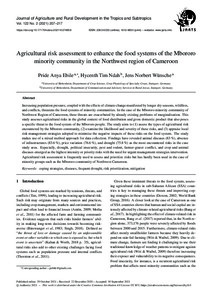Agricultural risk assessment to enhance the food systems of the Mbororo minority community in the Northwest region of Cameroon
| dc.date.accessioned | 2021-11-02T11:32:27Z | |
| dc.date.available | 2021-11-02T11:32:27Z | |
| dc.date.issued | 2021-10-29 | |
| dc.identifier | doi:10.17170/kobra-202110274959 | |
| dc.identifier.uri | http://hdl.handle.net/123456789/13349 | |
| dc.language.iso | eng | eng |
| dc.rights | Namensnennung 4.0 International | * |
| dc.rights.uri | http://creativecommons.org/licenses/by/4.0/ | * |
| dc.subject | coping strategies | eng |
| dc.subject | diseases | eng |
| dc.subject | frequent drought | eng |
| dc.subject | risk prioritization | eng |
| dc.subject | mitigation | eng |
| dc.subject.ddc | 300 | |
| dc.subject.ddc | 630 | |
| dc.title | Agricultural risk assessment to enhance the food systems of the Mbororo minority community in the Northwest region of Cameroon | eng |
| dc.type | Aufsatz | |
| dcterms.abstract | Increasing population pressure, coupled with the effects of climate change manifested by longer dry seasons, wildfires, and conflicts, threatens the food systems of minority communities. In the case of the Mbororo minority community of Northwest Region of Cameroon, these threats are exacerbated by already existing problems of marginalisation. This study assesses agricultural risks in the global context of food distribution and gross domestic product that also poses a specific threat to the food system of the Mbororo people. The study aims to (1) assess the types of agricultural risk encountered by the Mbororo community, (2) examine the likelihood and severity of these risks, and (3) appraise local risk management strategies adopted to minimise the negative impacts of these risks on the food system. The study makes use of a mixed method approach for data collection. Findings have revealed animal diseases (83 %), absence of infrastructures (83.6 %), price variation (76.6 %), and drought (75.8 %) as the most encountered risks in the case study area. Especially, drought, political insecurity, pest and rodent, farmer-grazer conflict, and crop and animal diseases emerged as the highest intensity or priority risks with the need for urgent management strategies intervention. Agricultural risk assessment is frequently used to assess and prioritize risks but has hardly been used in the case of minority groups such as the Mbororo community of Northwest Cameroon. | eng |
| dcterms.accessRights | open access | |
| dcterms.creator | Ebile, Pride Anya | |
| dcterms.creator | Ndah, Hycenth Tim | |
| dcterms.creator | Wünsche, Jens Norbert | |
| dc.subject.swd | Kamerun | ger |
| dc.subject.swd | Bewältigung | ger |
| dc.subject.swd | Bevölkerungswachstum | ger |
| dc.subject.swd | Klimaänderung | ger |
| dc.subject.swd | Krankheit | ger |
| dc.subject.swd | Trockenheit | ger |
| dc.subject.swd | Ernährung | ger |
| dc.subject.swd | Risikoanalyse | ger |
| dc.subject.swd | Landwirtschaft | ger |
| dc.type.version | publishedVersion | |
| dcterms.source.identifier | eissn:2363-6033 | |
| dcterms.source.issue | No. 2 | |
| dcterms.source.journal | Journal of Agriculture and Rural Development in the Tropics and Subtropics (JARTS) | eng |
| dcterms.source.pageinfo | 207-217 | |
| dcterms.source.volume | Vol. 122 | |
| kup.iskup | false |
Dateien zu dieser Ressource
Das Dokument erscheint in:
-
Vol 122, No 2 (2021) [16]


